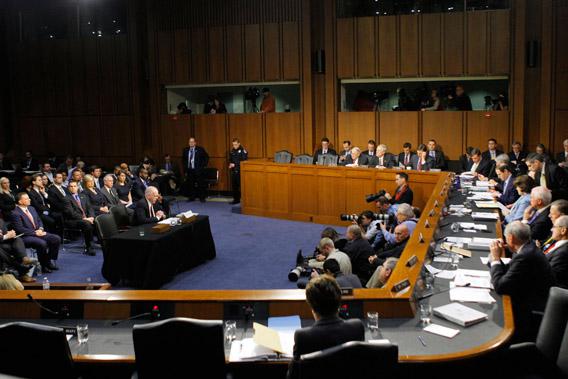The documents detailing the National Security Agency’s surveillance program were leaked by a former NSA contractor, Edward Snowden, but two members of the Senate Intelligence Committee—Ron Wyden (D-Ore.) and Mark Udall (D-Colo.)—have been hinting at the program for years. What repercussions would a member of Congress face if he or she revealed state secrets from a closed-door security briefing?
The legal ramifications are murky, but the political risks are clear. Legally, members of the House must swear a secrecy oath pledging not to disclose any classified information, although the Senate has no such oath. Members of Congress are protected by the Constitution’s speech or debate clause, which holds that members’ speech inside the chamber is immune from punishment, except for cases of treason, felony, or breach of peace. That protection was tested in Gravel v. United States in 1972, wherein former Alaska Sen. Mike Gravel read the Pentagon Papers into the congressional record after Daniel Ellsberg leaked the documents to news outlets. In that case, the Supreme Court held that Gravel was protected under the speech or debate clause. However, the clause has never been tested by a member of Congress publicizing classified information that had not already been leaked.
That still leaves the question of whether a member of Congress could be tried for treason after leaking classified information. Treason is defined in the Constitution as levying war against the United States or giving enemies “aid and comfort.” Whether a member was tried with treason would likely depend on the severity of the leaked documents, such as coordinates of U.S. troops in a major terror cell sting. As in all legal matters, semantics are key, and “aid and comfort” can be interpreted widely.
Functionally, there is no precedent for treason charges against an elected official. The last federal treason indictment was in 2006 against an American citizen who had appeared in al-Qaida videos calling for attacks on American soil. It was the first federal treason charge since 1952.
Federal employees (and private contractors such as Snowden) face much harsher punishment than members of Congress: An employee who publicizes communications intelligence to the country’s “detriment” faces a fine and a 10-year prison term.
Outside the legal scope, members of Congress would most certainly pay a steep political price for leaking classified information, especially if that member has been entrusted with a seat on an intelligence committee. Violating the core rules of the committee would make you a persona non grata among colleagues. And when election season rolls around, few voters are likely to look kindly on exposing state secrets—even in fairly liberal Oregon and Colorado.
Got a question about today’s news? Ask the Explainer.
Explainer thanks former Sen. Mike Gravel.
Read more on Slate about the NSA’s secret snooping programs.
